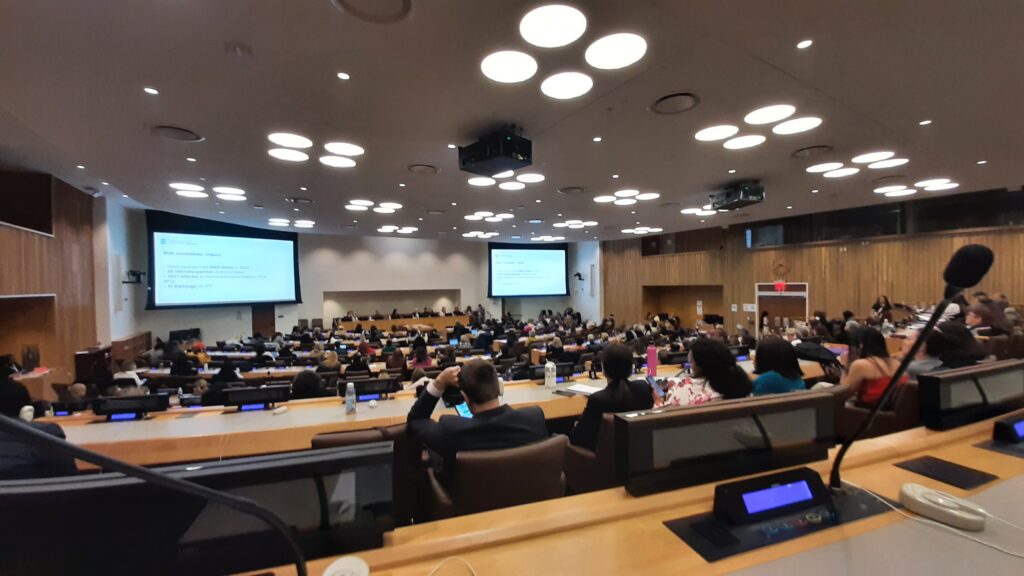“Inspiring and humbling.” UN women’s events lead discussion on digital access and security

I attended the 67th UN Commission on the Status of Women (CSW67) during its first week: March 6-11, along with Lucy Talgieh, the Women’s Project Coordinator at Wi’am: Palestinian Conflict Transformation Center and a KAIROS Women of Courage: Women, Peace and Security (WPS) partner. We were both under the accreditation of ACT Alliance, a global faith-based coalition.
Lucy weighed in on her experience with this thought-provoking blog: Technology, Cyber Space and total Isolation. I wrote an overview of CSW67 and its outcome: Tacking the gender digital divide at UNCSW67.
We spent much of our time attending official UN side-events, hosted by Member States, and NGO-led parallel events to learn about the specifics of the digital divide and solutions to the problem.
Gathering with women from around the world to share and discuss the significant problems and exciting opportunities and solutions concerning the digital divide was inspiring and humbling. Most of the events I attended were held in large boardrooms that fit about 60 people and were filled beyond capacity. The spaces felt charged as (mostly) women eagerly shared, asked questions and listened attentively to the subject at hand.
CSW offers hundreds of events that address, for the most part, the year’s priority and review themes. CSW67 focused on innovation and technological change and innovation in the digital age under the framework of gender equality, as well as challenges and opportunities to achieve gender equality and empowerment of rural women and girls.
KAIROS’ WPS partners are no strangers to issues related to digital access and security. They struggled to reach participants online during the pandemic when so many had limited access to digital technologies and the internet. They are also addressing the rise in online abuse and threats targeted at women and girls.
The following are highlights of what I learned at the CSW67 events.
ACT Alliance co-hosted several side and parallel events on digital access and security. In “A Phone of My Own,” a representative from the Youth Generation Equality Group in Finland told us about Right to be Online Manifesto that her group created to address online abuse and the lack of effort by online platforms to safeguard their sites. The manifesto calls on governments and tech companies to ensure the safety in these spaces rather than expect victims to carry the burden of responsibility, which translates to them disengaging from online platforms and subsequently self-censorship and silencing.
Other panelists spoke of the digital space’s potential to help women empower themselves. They advocated for training on how to use technology for active citizenship and activism. Young women in India for example use Instagram to challenge sexist tropes.
Women entrepreneurs and human rights defenders are providing innovative solutions for digital empowerment. Mariam Torosyan developed a mobile app called Safe YOU, which provides a virtual place for women to seek help from their community in a secure and supportive environment. It offers two layers of security and makes it impossible for other people to discover the app on a woman’s phone. Based in Armenia, Safe YOU is rapidly expanding to other countries. Mariam also spoke at a Canadian side event that focused on digital supports for women facing gender-based violence, including the Canadian Women’s Foundation’s Signal for Help – a simple hand signal used online to notify others if one is experiencing abuse at home.
Digital tech in support of MMIWG2+ and gender equity in Colombia featured at Canadian side event
In another Canadian side event called “Exploring the Impacts and Influences of Digital Technologies on Gender Based Violence Work,” I learned of an educational tool by Women’s Shelters Canada called Tech Safety Canada, which launched on International Women’s Day. While the website is for shelter and transition house workers to assist women, children and gender diverse people, this handy resource can be used by anyone.
I was delighted that this event’s panel included Rosanne Archibald, the National Chief of the Assembly of First Nations, and newly elected Colombian Senator, María José Pizarro Rodríguez – a member of the Historic Pact for Colombia party.
Chief Archibald called for the full implementation of the Calls for Justice, a reminder of the necessity to address the systemic causes of gender-based violence, especially among racialized women and girls. She acknowledged that technology can be useful in data collection, and that one of the Calls for Justice concerns a national database. She said that technology can help increase transparency and keep families updated on progress regarding their lost loved ones, provide consistency in investigation procedures and help identify missing and murdered women, girls and Two Spirited people. She noted that Washington State is the first jurisdiction to develop an online alert for Indigenous women.
Senator Rodríguez spoke about the devastating impacts on civil conflict in Colombia. She herself is touched by violence. Her father was killed in the conflict. The country is actively engaged in a renewed peace process and would like it to continue in the digital sphere. She spoke of the government’s commitment to assure digital access for all. They are challenged though. She told us that only seven percent of rural areas in her country have digital access. She didn’t specify how the Colombian government plans to bridge this gap.
The Senator also spoke of her commitment to gender equity and ending gender-based violence. She has sponsored draft legislation to improve women’s access to power, to mitigate violence against women, and to mitigate digital attacks against them. She also spoke of current strong laws that need to be implemented to support victims and penalize violators.

A Feminist Foreign Policy for Colombia
In a side-event hosted by Colombia, Laura Gil, the country’s Viceminister of Multilateral Affairs, spoke to us about her work in developing a Feminist Foreign Policy. I was drawn to the event due to the work of KAIROS’ Colombian partner, Organización Feminina Popular (OFP), which was very much involved in the peace process.
The Viceminister shared the FFP’s guiding principles, which include total peace within and beyond Colombia’s borders, real participation from women and gender diverse peoples from all ethnicities and change by and for women.
Gil acknowledged the challenge in implementing a FFP in a country that by and large regards feminism as a bad word. Despite that push back and acknowledgement that the country has a long way to go on gender equity, Gil said that in six months they accomplished much. Indeed, developing a FFP is a huge step forward. What would that mean for the country? According to Gill it would entail a feminist lens on climate change, trade, migration, diplomacy, culture and STEM (science, technology, engineering and mathematics).
During Colombia’s side event, two third party policy advisors from the Feminist Foreign Policy Collaborative and International Center for Research on Women (ICRW) weighed in on Colombia’s FFP. Both gave it strong marks. The advisor from ICRW noted that Colombia’ FFP clicks many of the priority boxes of the ICRW’s Feminist Foreign Policy Index, which launched that week. The Index’s priority areas include peace, disarmament and non-proliferation, migration for employment, economic justice including corporate accountability, gender equity in elected office, recognition of women’s agency in climate action, and share of gross national income (GNI) dedicated to international assistance and the volume directed at women’s organizations.
Many of these priorities click KAIROS priority boxes as well. Currently, KAIROS and its network have been calling on Canada to increase its international assistance to reach the international standard of 0.7 percent of GNI to fully fund its on Feminist International Assistance Policy.
Achieving Gender Equality in Decision-Making
KAIROS and its partners have been calling for women, youth and Indigenous peoples to have a seat at decision-making tables, particularly at international climate conferences and in peace processes. But what does that look like exactly? While civil society is sometimes consulted, decision making is done by political representatives. At the climate COP26, women led only 13 per cent of national delegations and comprised 38 per cent of national delegation totals.
Clearly, if we want more women at decision making tables, then we need to elect more women to public office. This was the focus of “Achieving Equality in Decision-Making by 2030: What will it take?” This side event was hosted by the Inter-Parliamentary Union, the Office of the UN High Commissioner for Human Rights and UN Women in collaboration with the Generation Equality’s Action Coalition on Feminist Movements and Leadership.
During the event, the Inter-Parliamentary Union presented its IPU-UN Women map, which presents global rankings for women in executive and government positions as of January 1, 2023. Worldwide, a paltry 26.5 percent of women are elected to office. In only 13 countries, half or more cabinet ministers are women. Canada ranks 14th at 48.6 percent women cabinet ministers, however it falls to 61 on women elected at 30.7 percent.
It was noted that based on the current rate of improvement, it will take 300 years to achieve gender parity in elected office. The speakers were keen on changing this trajectory. They spoke of the successful track record of quotas in ensuring parity, that countries with gender parity influence others, and the need for a framework on this issue. And of course, the world must tackle abuse directed at women politicians – both online and off –to ensure their safety and encourage more women to run for office.
Finally, Lucy and I, along with Simon Chambers of ACT Alliance, attended the Canadian reception at CSW67 and had an opportunity for a quick hello and photo op with Bob Rae, Canada’s UN Ambassador and Marci Ien, the Minister for Women and Gender Equality and Youth. They each delivered speeches on Canada’s role in the negotiations. Minister Ien had delivered a speech in the General Assembly earlier that day on what Canada is doing domestically and internationally to address the issues.
“Canada is also taking action to address harmful content online, with the goal of developing legislation,” she said. “Further, Canada’s Federal Gender-Based Violence Strategy, and 10-year National Action Plan to End Gender Based Violence are frameworks designed to adapt, evolve, and address emerging issues to create a Canada free of gender-based violence.”
Minister Ien spoke about Canada’s Feminist International Assistance Policy, adding, “we are encouraging innovative solutions to address development challenges and building partnerships with women’s rights organizations through the Women’s Voice and Leadership program.”
We hope that these good words translate into appropriate investment dollars in Canada’s Budget 2023, which will be announced March 28. Canada can be commended for its role in CSW67’s progressive agreed conclusion. It must now enact legislation that improves digital access and security, and invests well in these measures, including support for women grassroots organizations worldwide.
By Cheryl McNamara, KAIROS’ Communications and Advocacy Coordinator.
